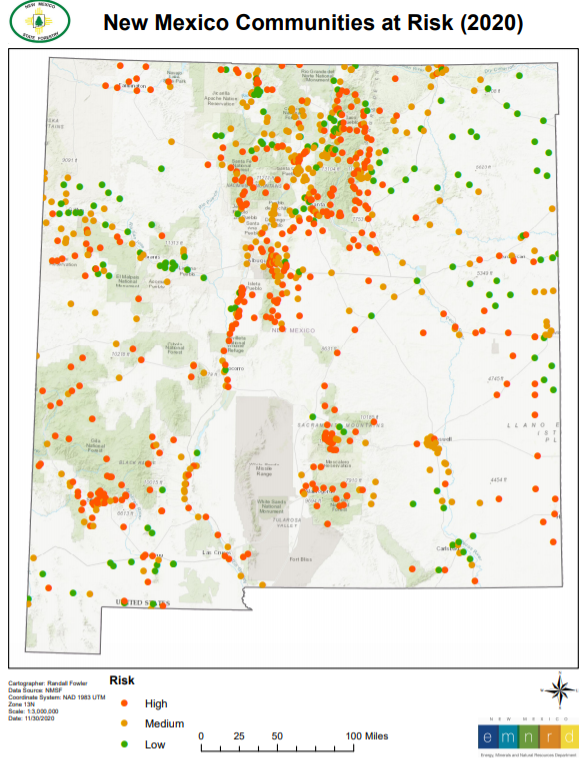Fire Professionals & Land Managers Resources
Relevant Pages
The Southwest Coordination Center (SWCC) is the interagency focal point for coordinating the mobilization of resources between the twelve Federal and State Dispatch Centers of the Southwest Area and, when necessary, the National Coordination Center (NICC) in Boise, ID. Located in Albuquerque, New Mexico, the SWCC mobilizes resources for wildland fire, prescribed fire, and all-risk incidents. In addition, the Center provides Predictive Services and Intelligence related-products in support of incident management decision-making for wildland fire managers and on-the-ground wildland firefighters.
The Southwest Fire Science Consortium is a “way for managers, scientists, and policy makers to interact and share science. Our goal is to see the best science used to make management decisions and scientists working on the questions managers need answered”. Visit their webpage to learn about upcoming webinars, events, field trips, workshops, conferences, and publications.
The New Mexico Energy, Minerals, and Natural Resources Department (EMNRD) - Forestry Division offers resources on fire prevention programs as well and prescribed burning, including the 2021 Prescribed Burning Act and the 2023 prescribed burning certification program.
Tool Boxes
Ready, Set, Go: On this website from CalFire, there are a number of toolkits to help increase your communities’ wildfire preparedness. Toolkit topics include: Evacuation, home hardening, defensible space, prescribed fires, Fourth of July, forest health, etc.
Community Wildfire Protection Plan: from the NM Energy, Minerals and Natural Resources Department, “CWPP’s have three main components: (1) Collaboration with all stakeholders throughout the CWPP process, (2) Identification and prioritization of hazardous fuel reduction areas, and (3) addressing the treatment of structural ignitability within the CWPP area.”
Fire Trainings
Sierra Blanca Wildland Fire Academy develops “professional and safe responses in the wildland environment by offering training and education that meets the National Wildfire Coordinating Group Standards.”
Check out the Wildland Fire Science Programs for first responders from the Eastern New Mexico University-Ruidoso
The Wildfire Resiliency Training Center at Luna Community College offers a structured pathway for wildland firefighters to advance from fundamental skills to intermediate-level leadership and specialized roles, covering safety protocols, tactical operations, and incident management.
Fire Technology
Simtable: “Simtable creates custom agent-based simulations based on data for wildland fire, storms, evacuation, flood, ecological behaviors and hazmat incidents in your communities. Simtable offers real solutions for interagency planning, training and education for emergency management incidents.”
BlueSky: “BlueSky is a modeling framework. BlueSky modularly links a variety of independent models of fire information, fuel loading, fire consumption, fire emissions, and smoke dispersion.”
Interagency Fuels Treatment Decision Support System (IFTDSS): “The Interagency Fuels Treatment Decision Support System (IFTDSS) is a web-based application designed to make fuels treatment planning and analysis more efficient and effective. IFTDSS provides access to data and models through one simple user interface. It is available to all interested users, regardless of agency or organizational affiliation. IFTDSS is designed to address the planning needs of users with a variety of skills, backgrounds, and needs. A simple and intuitive interface provides the ability to model fire behavior across an area of interest under a variety of weather conditions and easily generate downloadable maps, graphs, and tables of model results. Additionally, the application provides a step by step process for testing a variety of fuels treatment impacts (thin, clear cut, prescribed burn) on fire behavior and comparing results to determine which modeled treatment best achieves desired results in terms of reduced fire behavior potential. It can be used at a variety of scales from local to landscape level.”
WUI Chief's Guide
The WUI Chief’s Guide was designed by fire chiefs for fire chiefs to help provide a better understanding of the wildland-urban interface and the necessary information to help prepare, mitigate, respond, and recover from these events.
“The IAFC’s Wildland Fire Policy Committee identified a need for a complete resource for local chiefs and fire department leadership," said Erik Litzenberg, WFPC chair and city manager of Santa Fe, New Mexico. "The WUI Chief’s Guide provides a step-by-step, comprehensive approach, providing tips for chiefs of all experience levels to prepare their departments and communities for success against the threat of wildland fire and recovery.
This guide helps individuals understand how a fire chief or other official can help a community effectively manage the emerging risk of fires in the wildland-urban interface. Each section contains information and advice, case studies, and where possible, links to applicable resources.
All Hands All Lands Burn Team
The All-Hands All-Lands Burn Network (AHAL) is a collaborative effort lead by the Forest Stewards Guild and The Nature Conservancy of New Mexico, and supported by a variety of partners, including federal agencies, Tribes, Pueblos, youth corps, municipal fire departments, call-when-needed firefighters, the Rio Grande Water Fund, and many others to accelerate the return of fire to frequent fire ecosystems.
The initial goal for AHAL is to get ahead of prescribed fire backlogs on federal, state, and tribal lands and support private landowners’ use of prescribed fire. Although this network continues with this goal, the team has a wider capacity. Along with partners, the AHAL Burn Network works to increase the safety, effectiveness, and availability of prescribed fire as a land management tool. We achieve this by removing common barriers like cost, required qualifications, limited resources, lack of professional knowledge, and technical skill gaps. We also mobilize seasonal burn teams consisting of a mix of partners, contractors, staff, and volunteers to amplify knowledge, skills, and abilities. Lastly, we engage the public through stories, photos, and opportunities for involvement, to raise awareness for forests and watersheds.
Join the Burn Team
Are you a wildland firefighter or prescribed fire practitioner? Interested in volunteering to be part of the All-Hands All-Lands Burn Team to help put good fire on the ground, gain experience, and work on your qualifications? Fill out the form below to indicate your interest, availability, qualifications, and any training needs.
Potential Burn Projects
Use the form below to enter information about potential burn projects so that burns in the Rio Grande Water Fund landscape can be prioritized.
For inquiries please contact:
Sam Berry - SW Associate Director, Forest Stewards Guild
Will Joy - Prescribed Fire Specialist, The Nature Conservancy
Funding Opportunities
Summary of New Mexico funding opportunities for wildfire mitigation projects - Some programs listed are internal to agencies and require collaboration with nearby agency representatives.
Mental Health Resources
To help you prepare for life as a firefighter and your family cope with living with a firefighter, the National Wildfire Coordinating Group (NWCG) has created the Preparedness Guide for Firefighters and Their Families. This guide covers what to expect in terms of scheduling, demands, risks, and provides more clear insight for your family members who may be unfamiliar of what the life of a firefighter entails.
It is not uncommon for fire professionals to struggle with PTSD, substance abuse, suicidal thoughts or difficulties in relationships but there are resources available to help address and manage these challenges.




